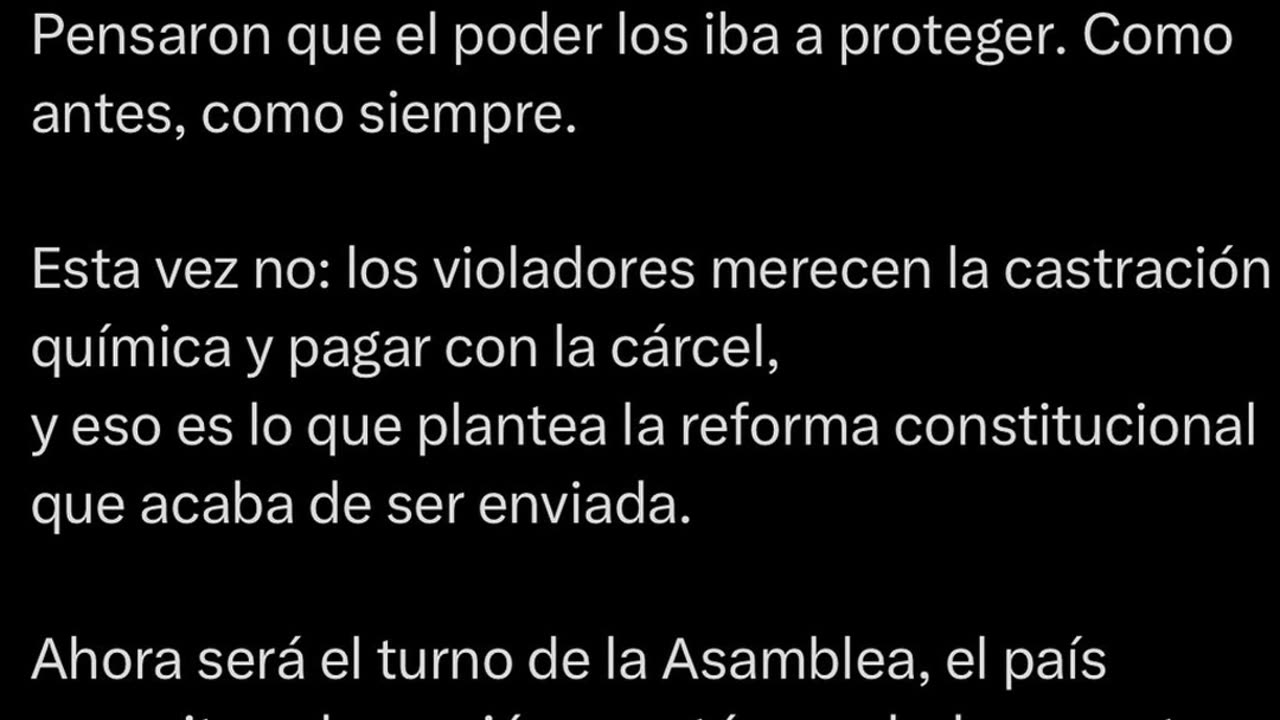Premium Only Content

Chemical Castration in Ecuador
In a decisive move to safeguard public security and protect Ecuadorian families, President Daniel Noboa has enacted a reform to the Comprehensive Organic Penal Code (COIP) establishing chemical castration as a punitive measure for those convicted of raping minors.
The legislation, approved by 85 votes in the National Assembly, responds to the alarming rise in sexual assaults: in 2024, the Ministry of the Interior reported 2,347 cases of sexual abuse against minors—a 12% increase compared to 2023.
This measure, set to take effect 60 days after its publication in the Official Register, seeks not only to punish but to deter recidivism in crimes that strike at the core of society: the family and the innocence of children.
The reform stipulates that individuals convicted of raping minors under the age of 14 may be subjected to chemical castration treatment, in addition to prison sentences ranging from 19 to 22 years.
The procedure, overseen by health authorities, involves the administration of medication designed to reduce libido and prevent deviant sexual behavior.
“We will not allow impunity to continue destroying lives. The family is the cornerstone of our nation, and the State must act firmly to protect it,” declared Noboa in a televised address. The measure has received support from traditional sectors, such as the Ecuadorian Episcopal Conference, which described it as “a step toward divine and human justice.”
María Fernanda Torres, leader of the Association of Families for Security, stated: “This is a clear message: abusers have no place in a society that values life and dignity.”
The social impact is undeniable. A recent Cedatos poll reveals that 78% of Ecuadorians support chemical castration, reflecting a widespread call for measures that prioritize victims.
However, left-wing organizations, such as Amnesty International, have criticized the reform, labeling it “inhumane” and citing studies suggesting that chemical castration does not entirely eliminate recidivism.
These criticisms, however, clash with the reality of a country where sexual violence has eroded trust in institutions. The reform strengthens values of order, legitimate authority, and the defense of tradition—essential to preserving the social fabric.
Moreover, it positions Ecuador as a regional example in the fight against sexual crimes, at a time when permissiveness has undermined public safety in other Latin American countries.
The left’s opposition to this reform reveals its persistent drift toward a brand of progressivism that, under the pretext of human rights, ends up defending perpetrators rather than victims.
Its rejection of firm measures perpetuates a narrative that downplays the severity of crimes against minors, undermining both security and the traditional values that uphold society.
While Ecuadorian families demand justice, the left becomes entangled in ideological debates that ignore the suffering of the most vulnerable. Chemical castration is not just a punishment; it is a commitment to life, family, and social order—principles that admit neither compromise nor ambiguity.
-
 1:51
1:51
Gateway Hispanic
9 hours agoEdmand Lara Reaffirms His Commitment to Transparency and the Constitution
3 -
 UPCOMING
UPCOMING
Anthony Rogers
1 day agoEpisode 389 - Tommy Gunn
58 -
 18:13
18:13
T-SPLY
3 hours agoChicago Mayor Accuses ICE Of Human Rights Violations!
14110 -
 1:09:47
1:09:47
iCkEdMeL
1 hour ago $2.16 earned🔴 Redwood City Standoff Erupts in Gunfire | Police Shooting Update
5.96K2 -
 13:10:31
13:10:31
LFA TV
23 hours agoLIVE & BREAKING NEWS! | TUESDAY 11/11/25
180K34 -
 30:53
30:53
BonginoReport
8 hours agoMonica Kelsey: The Woman Who Is Saving Countless Babies - Nightly Scroll w/ Hayley Caronia (Ep.175)
90.8K17 -
 1:08:36
1:08:36
Kim Iversen
5 hours agoFrom Head Chopping to The Oval Office: Who is Al-Sharaa?
96.6K76 -
 DVR
DVR
The Bold Lib
3 hours agoBOLDCHAT: The Intolerant Left | Veterans Day w/ANGELA BELCAMINO
12.2K1 -
 DVR
DVR
Quite Frankly
6 hours agoVeterans Day Lies, Legalized Betting, And More | Sal & J Gulinello 11/11/25
17.5K6 -
 LIVE
LIVE
Tundra Tactical
8 hours ago $2.42 earned🛑LIVE NOW!! Dad Gamer Attempts To Dunk On Nerds
111 watching